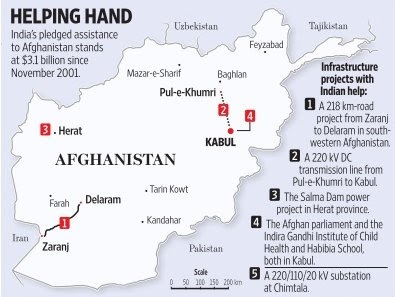India’s NSA Visit to Afghanistan | 15 Jan 2021
Why in News
Recently, the National Security Advisor (NSA) of India visited Afghanistan for talks on strategic issues with the leadership in Kabul.
Key Points
- First official visit since initiation of Intra-afghan talks:
- This visit is significant because it was the first visit by any senior Indian official amidst the Intra-Afghan Talks.
- Intra-Afghan talks refer to the negotiation meetings between the Taliban and the Afghan High Council for National Reconciliation (representative of Afghan Government) opened in Doha in 2020.
- These talks are facilitated and supervised by the United States, representatives of the Ghani government and the Taliban aimed at ending the decades-old war and forging a political settlement.
- Issues discussed:
- Exchanged views on the Peace Process, the beginning of 2nd round of (Intra-Afghan) talks, and the role of India in establishing peace in Afghanistan.
- Emphasis to synchronise efforts to combat terrorism and maintain peace in Aghanistan which shall become more challenging after the USA troops withdraw after Doha Peace Pact (2020).
- Doha Peace Pact: In February 2020, the USA and the Tabilan signed an agreement in Doha, (Qatar’s capital) which included:
- USA to withdraw all of its troops from Afghanistan in 14 months and would also release Taliban prisoners, held captive by the Afghan government.
- Assurance by Taliban that they would not allow transnational jihadist organisations such as al-Qaeda and the Islamic State to use Afganistan as their base and also committed to start direct talks with the Afghan government, which began in September 2020.
- Doha Peace Pact: In February 2020, the USA and the Tabilan signed an agreement in Doha, (Qatar’s capital) which included:
- India's Role in establishing Peace in Afghanistan:
- By participating in the intra-Afghan inaugural dialogue in Doha, India has shown its willingness to engage with all Afghan parties including the Taliban for peace in Kabul.
- India conveyed that the peace process must:
- Be Afghan-led, Afghan-owned and Afghan-controlled;
- Respect national sovereignty and territorial integrity of Afghanistan; and
- Promote human rights and democracy.
- India has a major stake in the stability of Afghanistan since it has invested considerable resources in Afghanistan's development.
- Significance of Stable Afghanistan for India:
- A stable Afghanistan government in power is a strategic asset vis-à-vis Pakistan.
- An increased political and military role for the Taliban and the expansion of its territorial control should be of great concern to India since the Taliban is widely believed to be a protégé of Islamabad.
- The country has the Central Asian Republics to the North, Pakistan to its East, and through Iran and Pakistan the Indian Ocean deeper south.
- Withdrawal of the USA troops could result in the breeding of the fertile ground for various anti-India terrorist outfits like Lashkar-e-Taiba or Jaish-e-Mohammed.
- A stable Afghanistan government in power is a strategic asset vis-à-vis Pakistan.
Way Forward
- India has reaffirmed its support to the Doha Agreement (2020) and intra-Afghan peace negotiations facilitating Afghan peace process and reiterated its commitment to Afghanistan’s pursuit of “sustainable peace and reconciliation”.
- India’s vision of a sovereign, united, stable, plural and democratic Afghanistan is one that is shared by Afghanistan, cutting across ethnic and provincial lines.
- Continuing such active engagement will enable India to work with like-minded forces in the region to ensure that the vacuum created by the USA withdrawal does not lead to an unravelling of the gains registered during the last two decades.

